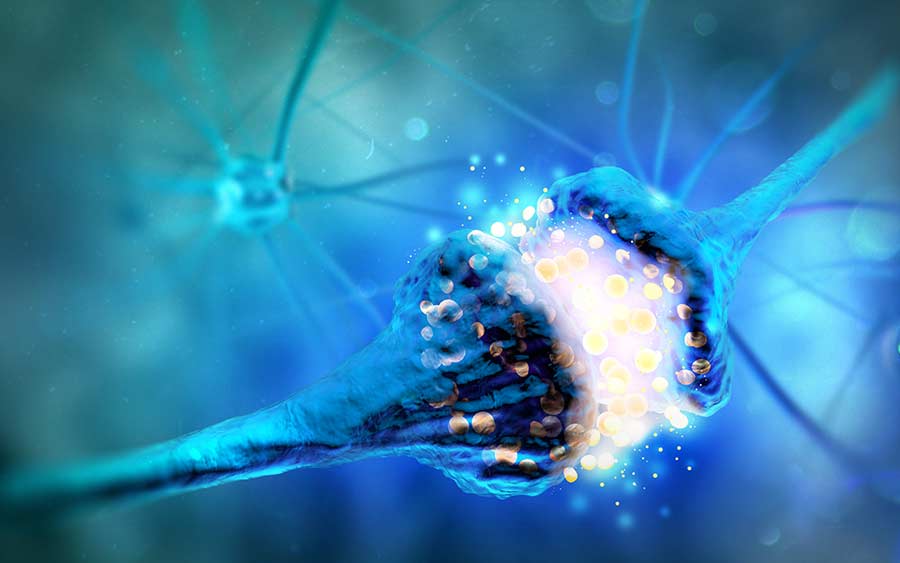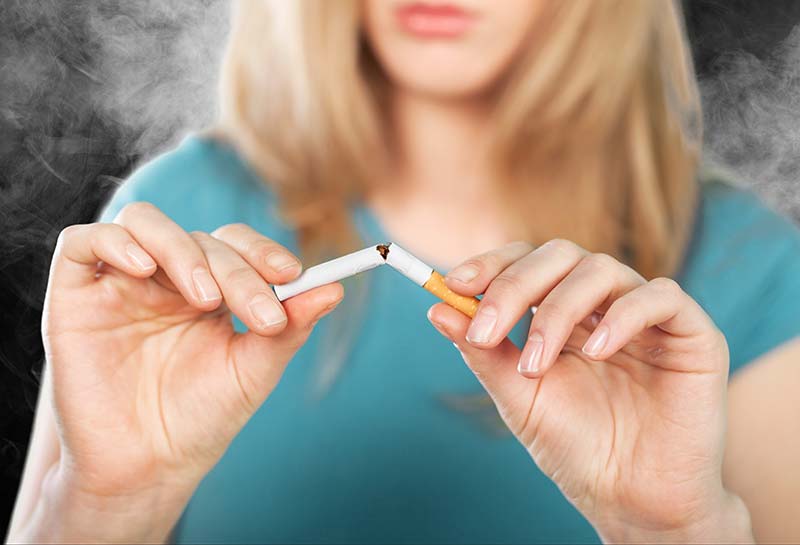Nicotine addiction affects millions around the world. It can be in the form of tobacco addiction, vaping, smokeless tobacco, nicotine patch, or nicotine gum addiction.
Just why is nicotine so addictive? How does it affect the body? And why does it cause withdrawal symptoms when you try to quit it?
We’ll answer all those questions. But first, let’s see what nicotine is.
What Is Nicotine? Facts & Definition
Nicotine is a toxic colorless or yellowish oily liquid which is the chief active constituent of tobacco. It acts as a stimulant in small doses, but in larger amounts blocks the action of autonomic nerve and skeletal muscle cells.
Nicotine Definition
- You can find nicotine in the leaves of tobacco plants. Tobacco is a plant and nicotine is a chemical compound that occurs naturally.
- There’s a small amount of nicotine in the leaves of the nightshade plants like tomatoes, potatoes, eggplant, chili peppers and bell peppers.
- Nicotine occurs naturally but that doesn’t mean it’s good for you. Nicotine is a natural insecticide and keeps plants from being eaten by insects.
- When in the human body, nicotine is a drug.
- As a drug, nicotine is a stimulant and a sedative.
- Does nicotine cause cancer? The jury is still out on whether or not nicotine is a carcinogen. Although it’s not con
s idered to be a carcinogen, many studies have found nicotine to promote the genesis of tumors. Nicotine can also create resistance in chemotherapy.
Symptoms of Nicotine Addiction
Using nicotine, in any form, can quickly lead to nicotine dependence.
Nicotine dependence is an addiction to products that contain nicotine. Being addicted means you can’t or don’t want to stop using the product you’re addicted to.
Below are some signs of nicotine addiction:
- Planning your activities and interests to allow smoking.
- Enjoying the taste and smell of cigarettes.
- Experiencing cravings for nicotine.
- Not enjoying socializing with non-smokers as much as you do with other smokers.
- Experiencing mental and physical withdrawal symptoms when you try to stop. Mood changes, irritability, headaches, increased appetite, restlessness, insomnia, are some of these symptoms.
- Continuing smoking or using nicotine despite health problems that would improve if you stopped.
- Rationalizing your behavior and finding reasons to smoke, vape or chew.
How Nicotine Addiction Works
Cigarette smoke or vapor is drawn into your lungs when you inhale. The smoke particles carry the nicotine into your lungs.
Once it reaches your lungs, nicotine is quickly absorbed into your bloodstream. And then your blood carries the nicotine to your brain.
The process happens so quickly that it takes only about 10 seconds for nicotine to reach your brain after you inhale.
When nicotine reaches your brain it releases dopamine and creates a buzz. This nicotine buzz has to do with why nicotine is addictive.
Smokeless Tobacco Addiction
If you chew tobacco or use snus or snuff, nicotine goes into your blood through the tissues lining your mouth. That takes a little longer than being absorbed through your lungs.
But once the nicotine is in your blood, it goes to your brain and affects it the same way other forms of nicotine do.
The CDC reports that the nicotine you absorb from smokeless tobacco lasts in the blood longer than the nicotine you inhale.
Effects of Nicotine on the Brain
Once the nicotine is in your brain, it binds to the receptors of some of your brain cells. Think about these receptors as a lock and the nicotine as a key.
It just so happens that nicotine can lock into these receptors, that are now called Nicotine receptors. (To be technical for a moment, their full name is nicotinic acetylcholine receptors, or nAChRs.)
The nicotine receptors are activated whenever a chemical binds to them. It’s usually acetylcholine, another chemical, that binds to these receptors, but nicotine can also bind to them.
In other words, nicotine “steals” the place of acetylcholine and binds to the receptors. This causes a release of happy chemicals or else, a nicotine buzz.

After a while, your brain releases less acetylcholine. Now you need nicotine to bind to the receptors. And that’s how nicotine becomes addictive.
What happens if you don’t get nicotine?
If the addicted brain doesn’t get nicotine, the receptors aren’t activated and you don’t feel right. That explains a lot of the irritability and discomfort that come with quitting smoking.
After you cut off nicotine and break the nicotine addiction, your level of acetylcholine will return to normal. You’ll be able to feel fine without nicotine.
Why is Nicotine Addictive
The nicotine receptors are located in the areas of your brain that have to do with pleasure and reward.
When a receptor is activated, there’s a release of neurotransmitters. They are chemical substances that convey nerve impulses. And dopamine is one of these neurotransmitters that causes and sustains addictions.
Dopamine and Feeling Good
Dopamine has a lot of functions. It contributes to movement, memory, attention, and lots of other activities. When it comes to smoking, the function that’s most important is feeling rewarded.
When a large amount of dopamine is released, you feel good. That’s why it’s the “feel-good hormone.”
A dopamine release is like getting an emotional reward.

And because nicotine reaches your brain so quickly, that reward-like feeling comes within seconds after you inhale. That instant gratification reinforces the nicotine dependence.
Dopamine is very important. It encourages us to repeat the behaviors that ensure our survival. Our brain rewards us when we eat, drink water, or have sex. Otherwise, we would starve to death and the human species would go extinct.
But this dopamine reward system can make harmful behaviors, like smoking, seem important, too.
Nicotine is neither food nor water and it does not protect our survival. It just tricks our brain into thinking we need it, just like we need food. That’s what nicotine addiction is. It makes us believe we can’t live without the thing we’re addicted to.
The mechanism of nicotine addiction is the same type of emotional reward you see in other addictions–to alcohol, cocaine, narcotics, and other drugs.
Dopamine and quitting smoking
Your brain releases dopamine not only when you do something pleasurable, but also when you expect to feel pleasure. So just the thought of doing something enjoyable, like having a delicious drink, can trigger a dopamine release.

For smokers, the sight of someone smoking can trigger that release. But if that sight–that expectation of a reward–isn’t followed by the nicotine your brain is expecting, your dopamine levels can drop. Now you have a low mood instead of pleasure.
And there are all sorts of cues and triggers that you’ve learned to associate with that reward. It might be a cup of coffee, a glass of wine, or taking a break.
You’ve taught your brain to expect nicotine when you do these things. So when you first stop smoking, your brain still expects those dopamine releases from nicotine. That causes cigarette cravings.
With time, your brain’s expectations will change. You’ll have fewer cravings and your brain will start releasing dopamine naturally, without relying on nicotine.
The More You Smoke, the More Addicted You Become
The number of nicotine receptors actually increases in smokers. If you’ve been smoking heavily for years, you probably have more nicotine receptors than you did before you started smoking.
Having more nicotine receptors means you need more nicotine to bind to them. When receptors aren’t activated, you can begin to feel withdrawal symptoms.
When you smoke regularly, you build up tolerance for nicotine and you stop experiencing the nicotine buzz.
Instead, you need to smoke just to avoid feeling withdrawal.

Genetic Factors of Nicotine Addiction
Genes play a role in addiction, too.
You can inherit how your nerve cells respond to nicotine. And the way your nerve cells respond affects how easily you become addicted or how much you smoke, vape, or chew.
In fact, some researchers believe that the risk of becoming addicted is, 50 to 75%, due to your genes!
The number of nicotine receptors in your brain increases if you’re a heavy smoker. But how much that number increases depends on your genes.
Some people don’t develop many nicotine receptors, no matter how much they smoke. If you’re one of those people, you are a light smoker.
But if you’re someone who has formed a lot of additional nicotine receptors, you probably consume more than a pack a day.
Nicotine Side Effects on the Brain
One of the most significant dangers of nicotine is that it throws the brain chemicals, like dopamine and endorphin, out of balance. Research shows nicotine also prevents the genesis of new brain cells.
Side effects of nicotine on the brain of adults:
- Dizziness
- Disrupted sleep patterns
- Blood flow restriction
Side effects of nicotine on the brain of teenagers and young adults:
- Nicotine creates lasting impairments in memory, attention, and learning. The brain changes until the age of 25, and nicotine has a negative impact on that change.
Is Nicotine Bad for You? What Does Nicotine Do to Your Body
Cigarette addiction has other physical effects, too. Nicotine affects the cardiovascular, respiratory, gastrointestinal, renal, and reproductive systems of the body.
Nicotine affects your blood circulation and heart
- Causes plaque on the artery walls, known as atherosclerosis, which may lead to a heart attack.
- Blood vessels lose their elasticity which limits the oxygen that flows to your organs.
- Your heart rate increases as your heart tries to take in more oxygen which in turn, increases your risk of high blood pressure, cardiovascular disease
and stroke.
Nicotine affects your insulin levels, contributing to the risk of diabetes
- It stimulates the adrenal gland to release adrenaline. It’s a hormone, also known as epinephrine, that speeds up your heart rate by supplying more blood to your muscles, brain
and heart. While this makes you feel more alert and energetic, it burdens your heart. - Adrenaline also makes your body release more glucose into your blood. And it slows the release of insulin from your pancreas. The result is a higher blood glucose level, and insulin resistance.
Nicotine affects the respiratory system and the lungs
- It plays a role in the development of emphysema.
- Causes airway resistance by stimulating the parasympathetic ganglia.
- Nicotine affects the Central Nervous System and alters respiration.
- Nicotine can contribute to pneumonia.
- Vaping also increases the risk of pneumonia, according to a study published in the European Respiratory Journal has found.

Nicotine affects your gastrointestinal system
- Nicotine is linked to Gastro Esophageal Reflux Disorder (GERD) and peptic ulcer disease (PUD).
- It causes dry mouth, heartburn, and nausea.
Nicotine affects pregnancy
- The Americal Lung Association reports that nicotine during pregnancy can harm the brain and lung development of the fetus.
- Nicotine addiction also affects the mental and physical health of the mother, causing low birth weights, premature birth, or stillbirth.
- Research shows nicotine can also cause obesity, hypertension, high blood pressure, type 2 diabetes, problems with brain and behavior development and even respiratory failure.
The Mental & Behavioral Side of Nicotine Addiction
Another reason why nicotine is addictive is that it becomes part of your routine and a coping mechanism. This creates a mental and psychological dependence on nicotine.
While nicotine goes to your brain and creates this dopamine release, you’re usually doing certain things or activities.
So your brain has learned to link smoking and nicotine to those activities, routines, habits, and situations.
These situations become triggers. If you usually smoke while talking on the phone, then after a while talking on the phone will trigger cravings.
There are 4 types of smoking triggers: emotional, environmental, social, and double-habit triggers. Some of them are:
- Emotions you want to escape (anxiety, boredom)
- Seeing other people smoking or smelling cigarettes
- In between tasks
- After a meal
- Morning coffee or tea
- Alcoholic drink
- Talking on the phone
- Taking a break
- Driving
- Celebrating
- Socializing
With time, these situations seem incomplete or unenjoyable without cigarettes or nicotine. If you smoke when bored, then your brain has learned to expect a dopamine release when you feel that way.
If this dopamine release doesn’t come then you momentarily feel down. You may even think that boredom is unbearable without smoking, vaping, or nicotine.
That’s natural. The more you smoke, the more you rely on nicotine to cope with life. If you feel stressed or anxious, you probably smoke. After a while, it’s easy to think you can’t calm down or relax without that cigarette.
Fortunately, that’s not the case. Everything you do as a smoker you can do better as a non-smoker.

When you are nicotine-free your brain gradually breaks the association between your triggers and smoking. Just like your brain learned to expect nicotine, it can learn to not expect it.
Breaking the Cycle of Nicotine Addiction
The only way to break the cycle of addiction is to stop using nicotine.
Smoking is a mental and a physical addiction, so to quit for good you need to deal with both aspects.
It’s natural to feel a sense of loss when you quit smoking. After all, addiction taught your brain to release most of its dopamine when nicotine is present.
In the beginning, you may feel irritable, restless, angry, or sad. It can be tempting to reach for a cigarette to try to deal with these emotions.
Keep in mind that staying away from smoking is the fastest way to overcome those feelings. Get moving, stay busy, keep a positive attitude. You can do this!
When you quit smoking, your brain will adjust so that you can enjoy pleasurable activit
The best treatment for nicotine addiction is to change how you think about nicotine and learn how to be happy without it. This might take some time, but it will be worth it.
Cravings for Nicotine
After 3-6 days most nicotine will be out of your body so the physical cravings for nicotine will subside. Any cravings you experience after that are mental cravings.
Mental cravings are thoughts of smoking, vaping, or chewing.
But they’re thoughts, not commands.

If you stay away from nicotine, those extra nicotine receptors in your brain will disappear and you’ll be back to normal levels of receptors in about a month.
Your body will heal from the effects of nicotine and smoking. And you’ll learn to enjoy life without a cigarette, even if it seems impossible at first.
Truth is, nicotine offers you nothing at all. If you believe it does, it’s because of the addiction. Once the addiction goes, you will start adapting to a new lifestyle that’s more fulfilling.
Nicotine Withdrawal
Just as the nicotine addiction has physical and psychological causes, nicotine withdrawal has both physical and psychological symptoms.
Headaches, tremors, and trouble sleeping are a few of the physical symptoms. Changes in mood–anxiety, sadness, anger, irritability–are some of the psychological symptoms. You can learn about the nicotine withdrawal symptoms here.
Every withdrawal is different. Some smokers find that they crave sweets and gain weight, while others exercise more and lose weight.
If you experience withdrawal symptoms, keep in mind that they will pass. They’re most troublesome in the first few days after you quit smoking, and will lessen over time.
You’re simply going through an adjustment period where you have to learn to live as a non-smoker.
Your Future as a Happy Nonsmoker
Ups and downs are a natural part of life. You’ll have them whether you smoke or not.
But if you stay away from nicotine, you’ll overcome the smoking addiction and learn other ways of coping.
Soon enough, you’ll learn to relax without having a cigarette.
You’ll be healthier, you’ll breathe more easily. You’re likely to live longer.
And think of all the money you’ll save!


